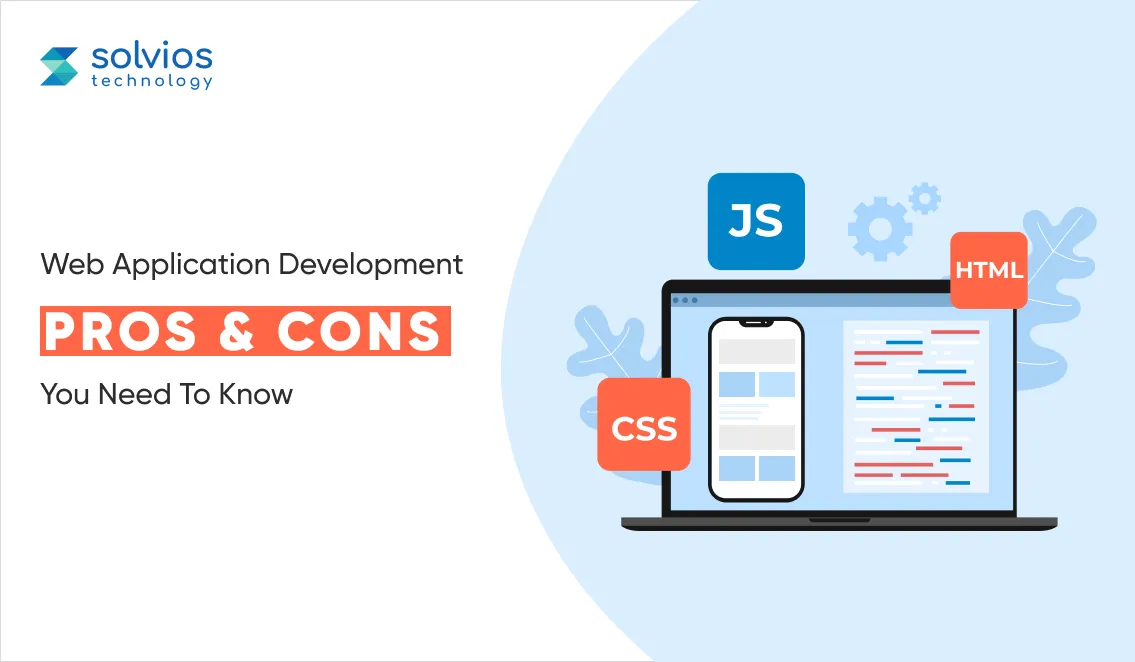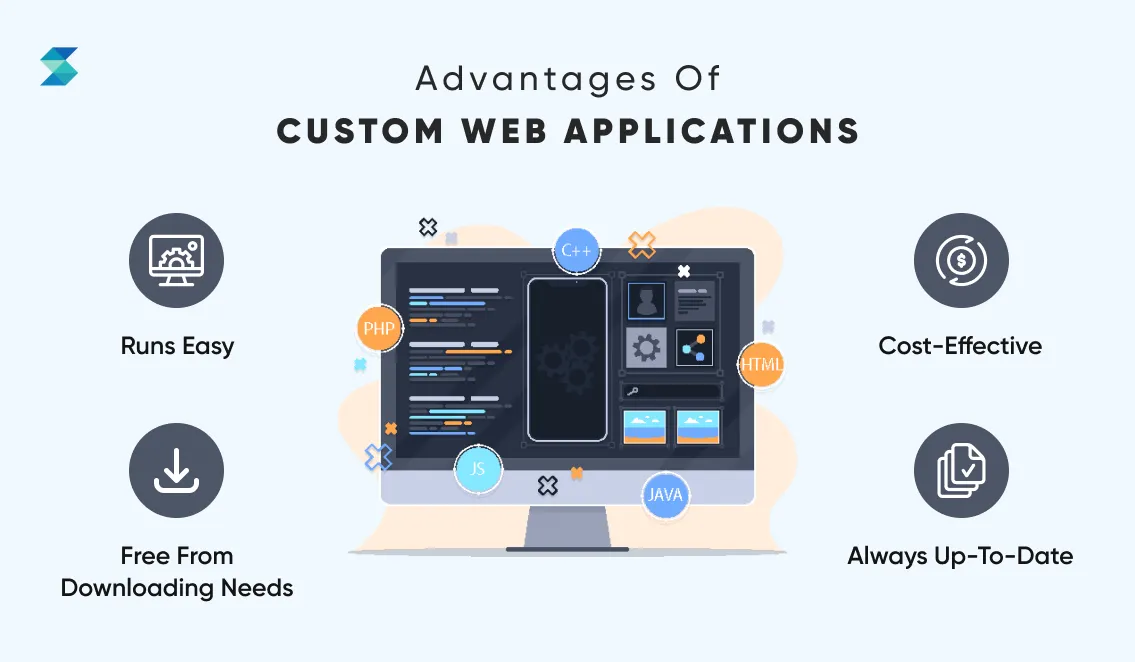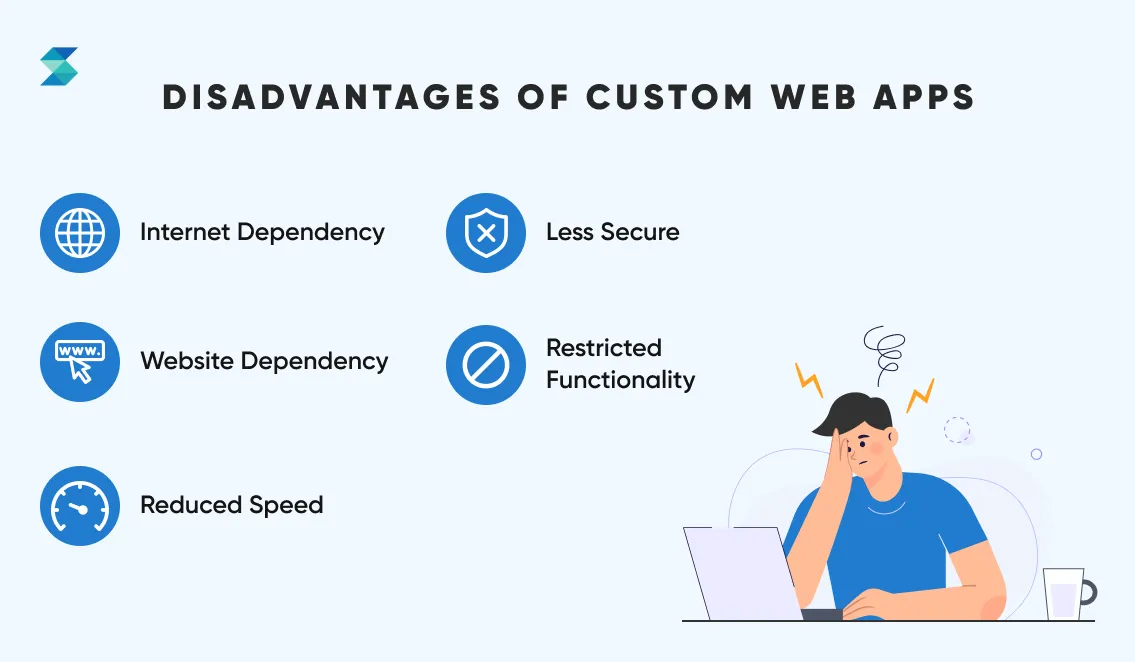
Is web app Development in demand? The answer is ‘YES.’ Web Application is nothing but an application software that can be accessed through a web browser.
Web applications are essential for businesses these days. They help companies grow, improve customer service, and remain competitive. By automating tasks and reaching customers globally, web apps offer significant convenience and accessibility. Users can access services from any internet-enabled device, enhancing their experience. However, developing these applications can be challenging, requiring time, resources, and up-to-date knowledge of the latest technologies and security measures. Despite the complexities, web applications remain powerful tools that drive business success. Let’s explore the key aspects of web application development to understand its impact on modern businesses.
Explore the Advantages of Web Application Development

Web applications provide businesses with a versatile and efficient solution for their digital needs, offering several key benefits.
1. Cross-Platform Compatibility
Web apps are designed to operate seamlessly across different operating systems,systems, such as iOS, Android, and Windows. This cross-platform compatibility ensures a consistent user experience regardless of the device used, eliminating the need to develop separate versions for each platform.
2. Access via URL
One of the key benefits of web apps is their accessibility through a simple URL. Users can access the application directly through a web browser without the need for downloading and installing it from app stores like Google Play or Apple’s App Store. This ease of access simplifies user adoption and eliminates barriers associated with installation processes.
3. No Installation Required
Unlike native apps, which require installation on the user’s device, web apps do not need to be downloaded. This saves users time and storage space, as they can access the app instantly through their preferred web browser. It also reduces friction in adoption, as users can engage with the app immediately without waiting for downloads to complete.
4. Automatic Updates
Web apps are updated centrally on the server side, ensuring that all users have access to the latest version simultaneously. This eliminates the need for users to manually update the app through app stores, streamlining maintenance efforts for developers and ensuring consistent performance and security across all devices.
Let’s Talk About Your Web App Project Idea!
Contact Us Now!5. Cost Efficiency
Developing web apps is generally more cost-effective compared to native app development. Instead of creating and maintaining multiple versions for different platforms, developers focus on a single codebase that serves all users through the web. This approach reduces development costs, time-to-market, and ongoing maintenance expenses.
6. Scalability
Web apps can scale effectively to accommodate growing user bases and increased traffic. Scaling is primarily managed on the server side, allowing developers to expand resources and capabilities as needed without significant changes to the app itself. This scalability ensures that web apps can handle fluctuations in demand without compromising performance.
Disadvantages of Custom Web Applications

Apart from advantages, there are disadvantages companies need to be aware of when using web apps.
1. Responsive Design Challenges
Ensuring responsiveness across various devices and screen sizes is crucial for web apps. If the underlying website or web application is not designed responsively, users may experience usability issues such as content not displaying correctly or navigation difficulties. Achieving a consistent user experience requires meticulous attention to responsive design principles. Here, you will require the expertise of custom web application developers to ensure a responsive experience for the users.
2. Dependency on Internet Connection
Web apps rely on a stable internet connection to function properly. Offline access is limited or nonexistent, which can hinder usability in environments with unreliable or restricted internet connectivity. Users may experience disruptions or inability to access the app when offline, impacting the overall user experience.
3. Visibility and Discoverability
Unlike native apps that are prominently featured and discoverable in app stores, web apps depend on direct URLs for access. This can affect their visibility to potential users who rely on app stores to discover new applications. Marketing and promotion strategies are crucial to increase awareness and drive traffic to web apps.
4. Limited Access to Device Features
Web apps may have restricted access to certain hardware features and APIs compared to native apps. This limitation can affect the functionality and performance of the app, particularly for features that require direct integration with device capabilities such as sensors or advanced graphics. Developers must carefully evaluate feature requirements and consider alternatives or workarounds when building web apps.
5. Performance Considerations
The performance of web apps can be influenced by factors such as server load, internet speed, and browser compatibility. Heavy data processing or complex functionalities may lead to slower performance or delays, especially during peak usage periods. Optimizing performance through efficient coding practices and server management is essential to ensuring a smooth user experience.
6. Security Vulnerabilities
Web apps are susceptible to security risks such as cross-site scripting (XSS) and cross-site request forgery (CSRF) due to their reliance on web technologies. Ensuring robust security measures, such as data encryption, secure authentication methods, and regular vulnerability assessments, is critical to protect user data and maintain trust.
To navigate these challenges effectively, consult Solvios Technology, one of the leading custom application development companies. With our years of practical industry experience, you can be assured that your web app is robust, secure, and tailored to your unique requirements. Our web app development services are the most cost-effective in the market.
The Bottom Line
Web application development offers numerous advantages, such as cost-effectiveness, ease of updates, and platform independence. However, businesses must also consider disadvantages like internet dependency, reduced speed, and security concerns. By leveraging the expertise of custom application development companies like Solvios Technology, businesses can maximize the benefits and minimize the drawbacks of web app development services, ensuring a robust and efficient digital solution. Connect with us for custom web application development costs.
Contact Us to Know How We Can Help You to Get your App Idea.
Click Here!Frequently Asked Question
Web application development refers to the process of creating software applications that run on web browsers. These applications can perform various functions, such as online shopping, social media interactions, and business management.
We understand that every web app project is unique, and its cost can vary based on factors like features, complexity, and development time. We offer personalized quotes tailored to your project requirements, ensuring you get the best value for your investment.
Let’s discuss your project needs, and we’ll provide you with a customized quote accordingly.
We understand that every web app project is unique, and its cost can vary based on factors like features, complexity, and development time. We offer personalized quotes tailored to your project requirements, ensuring you get the best value for your investment.
Let’s discuss your project needs, and we’ll provide you with a customized quote accordingly.
We understand that every web app project is unique, and its cost can vary based on factors like features, complexity, and development time. We offer personalized quotes tailored to your project requirements, ensuring you get the best value for your investment.
Let’s discuss your project needs, and we’ll provide you with a customized quote accordingly.
Tags
Related Blog
Want to get started with App Development?
These applications are acquiring enormous prevalence by offering hands-on enterprise mobility solutions for organizations around the globe.
Start A Conversation
















